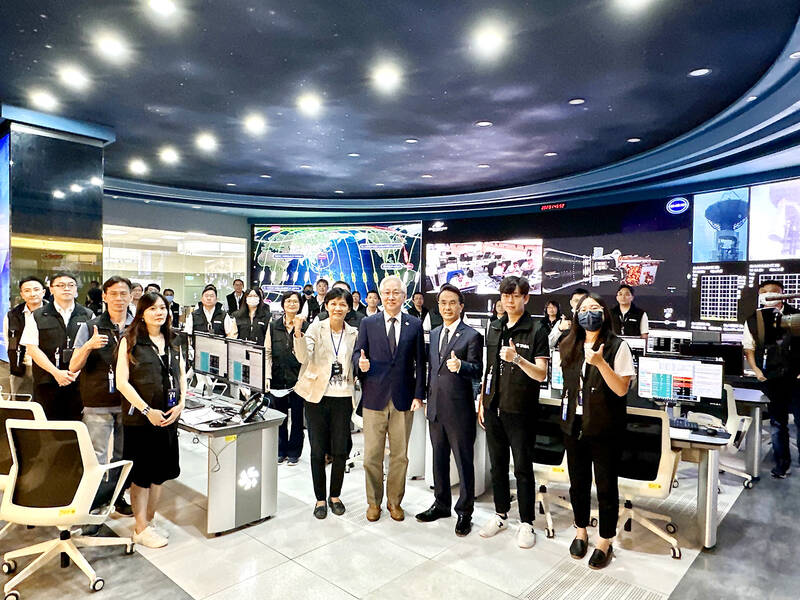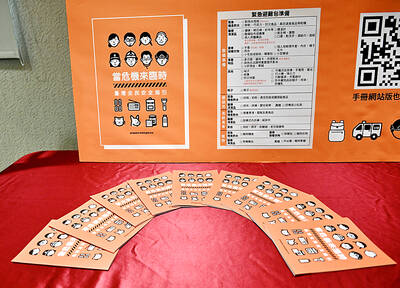Triton, Taiwan’s first domestically produced weather satellite, was successfully launched into space from French Guiana and entered orbit yesterday morning, the Taiwan Space Agency (TASA) said.
The satellite was launched at 9:36am Taiwan time on Vega, an Ariane space commercial launcher designed with a target payload lift capability of 1,500kg and which has had 22 missions.
Triton was ejected from the launcher about 54 minutes after takeoff and communicated with Troll, a Norwegian research station in Antarctica, at 12:19pm, TASA Director-General Wu Jong-shinn (吳宗信) said.

Photo: screen shot from a Taiwan Space Agency livestream
The satellite was scheduled to communicate with a ground station in Taiwan for the first time when it passed by at 8:56pm yesterday, he said.
Triton was scheduled to launch on Saturday, but the mission was postponed after an abnormality was discovered 14 seconds into the countdown. The mission resumed following a 48-hour close inspection of the launch vehicle, Wu said.
The satellite is carrying the Global Navigation Satellite System-Reflectometry (GNSS-R), which is tailored to analyze signals reflected by the global navigation satellite system on the surface of the sea to analyze wind speeds, Wu said, adding that data collected by the GNSS-R would be important for climate science research and weather forecasting.

Photo: CNA
Climate researchers and meteorologists can use the satellite to observe extreme weather and typhoons in low-latitude zones of the central Pacific Ocean, the Indian Ocean and the Atlantic Ocean, Wu said.
About 82 percent of the Triton satellite, including the payload, was developed and manufactured in Taiwan, the TASA said, adding that more than 20 research-and-development units and manufacturers participated in the development of the equipment at the ground station.
President Tsai Ing-wen (蔡英文) thanked everybody involved in the successful launch of Triton for persevering despite the challenges.
“Not only is this a major step forward for Taiwan’s aerospace industry, but it is also an achievement that should make all Taiwanese proud,” Tsai said.
“The successful launch of Triton has proven that Taiwan has an advantage in manufacturing semiconductors and precision equipment. We absolutely have the capability to advance the global aerospace industry,” she said.
The government is scheduled to launch Phase III of its space program, to which NT$25 billion (US$776 million) would be devoted over 10 years, to build a space industry chain and cultivate next-generation talent in the space industry.
The launch of Formosat-5 in 2017 and Formosat-7 in 2019 showed that Taiwan has the capability to develop its own satellites, Tsai said.
“From the transonic advanced jet trainer AIDC T-5 Brave Eagle, the Hai Kun submarine launch to the launch of Triton into space, we can proudly say to the next generation: Taiwan-made products can be showcased in the international market and can fly in the air, be immersed in the sea and operate in space,” Tsai said.

One of two tropical depressions that formed off Taiwan yesterday morning could turn into a moderate typhoon by the weekend, the Central Weather Administration (CWA) said yesterday. Tropical Depression No. 21 formed at 8am about 1,850km off the southeast coast, CWA forecaster Lee Meng-hsuan (李孟軒) said. The weather system is expected to move northwest as it builds momentum, possibly intensifying this weekend into a typhoon, which would be called Mitag, Lee said. The radius of the storm is expected to reach almost 200km, she said. It is forecast to approach the southeast of Taiwan on Monday next week and pass through the Bashi Channel

NO CHANGE: The TRA makes clear that the US does not consider the status of Taiwan to have been determined by WWII-era documents, a former AIT deputy director said The American Institute in Taiwan’s (AIT) comments that World War-II era documents do not determine Taiwan’s political status accurately conveyed the US’ stance, the US Department of State said. An AIT spokesperson on Saturday said that a Chinese official mischaracterized World War II-era documents as stating that Taiwan was ceded to the China. The remarks from the US’ de facto embassy in Taiwan drew criticism from the Ma Ying-jeou Foundation, whose director said the comments put Taiwan in danger. The Chinese-language United Daily News yesterday reported that a US State Department spokesperson confirmed the AIT’s position. They added that the US would continue to

The number of Chinese spouses applying for dependent residency as well as long-term residency in Taiwan has decreased, the Mainland Affairs Council said yesterday, adding that the reduction of Chinese spouses staying or living in Taiwan is only one facet reflecting the general decrease in the number of people willing to get married in Taiwan. The number of Chinese spouses applying for dependent residency last year was 7,123, down by 2,931, or 29.15 percent, from the previous year. The same census showed that the number of Chinese spouses applying for long-term residency and receiving approval last year stood at 2,973, down 1,520,

EASING ANXIETY: The new guide includes a section encouraging people to discuss the threat of war with their children and teach them how to recognize disinformation The Ministry of National Defense’s All-Out Defense Mobilization Agency yesterday released its updated civil defense handbook, which defines the types of potential military aggression by an “enemy state” and self-protection tips in such scenarios. The agency has released three editions of the handbook since 2022, covering information from the preparation of go-bags to survival tips during natural disasters and war. Compared with the previous edition, released in 2023, the latest version has a clearer focus on wartime scenarios. It includes a section outlining six types of potential military threats Taiwan could face, including destruction of critical infrastructure and most undersea cables, resulting in